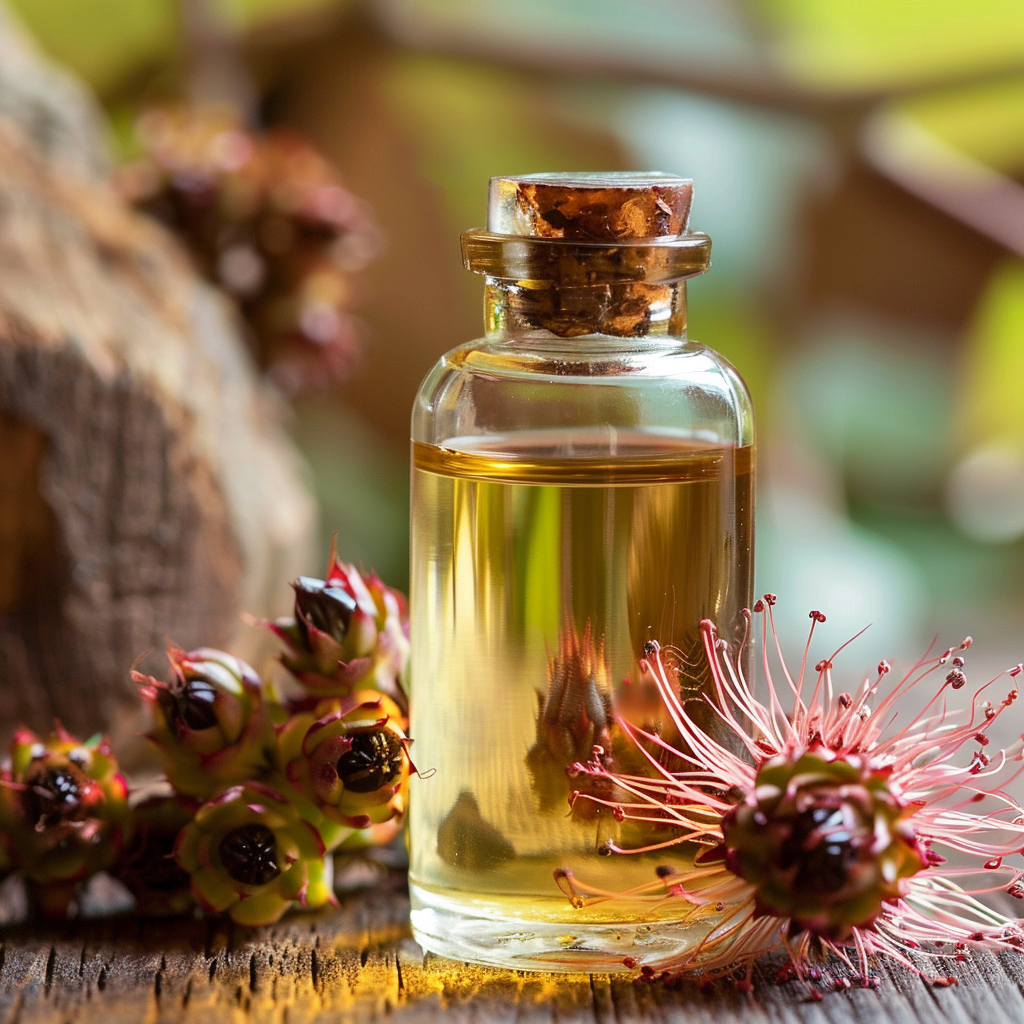Organic castor oil is renowned for its numerous health and beauty benefits, but its distinctive smell often sparks mixed reactions. This article explores the characteristics of the organic castor oil smell, its benefits and drawbacks, and how to manage it effectively. By understanding the nuances of this natural oil’s aroma, you can make the most of its many uses.
Characteristics of Organic Castor Oil Smell
The organic castor oil smell is unique and can be quite potent. It is often described as earthy, slightly musty, and somewhat pungent. This strong aroma is due to the high concentration of ricinoleic acid, a fatty acid that contributes to the oil’s therapeutic properties.
The intensity of the smell can vary depending on the processing method used to extract the oil. Cold-pressed organic castor oil tends to have a more pronounced odor compared to refined versions. The unrefined oil retains more of the natural compounds that give castor oil its characteristic scent.
For some, the organic castor oil smell can be off-putting, especially if they are sensitive to strong scents. However, understanding that this natural aroma is a sign of the oil’s purity and potency can help users appreciate its benefits despite the smell.
Benefits of Organic Castor Oil Smell
One of the benefits of the organic castor oil smell is that it indicates the presence of potent, natural compounds. These compounds, such as ricinoleic acid, are responsible for the oil’s anti-inflammatory, antimicrobial, and moisturizing properties. The strong smell is a sign that the oil is rich in these beneficial substances.
The natural aroma of organic castor oil can also have a grounding and calming effect. Aromatherapy practitioners often use earthy scents to promote relaxation and stress relief. While castor oil is not commonly used in aromatherapy for its smell alone, its aroma can still contribute to a calming atmosphere when used in skincare or haircare routines.
Additionally, the distinctive smell can serve as a reminder to use the oil sparingly. A little goes a long way with organic castor oil, and its potent scent can help ensure that users do not over-apply the product, maximizing its benefits while minimizing waste.
Drawbacks of Organic Castor Oil Smell
Despite its benefits, the organic castor oil smell can be a drawback for many users. The strong, earthy scent can be overpowering, especially for those with a sensitive sense of smell. This can make the oil less appealing to use regularly, despite its many benefits.
Another drawback is that the smell can linger on the skin or hair after application. While some may not mind this natural scent, others might find it unpleasant, especially if they are in environments where strong smells are not welcome. This lingering aroma can also interfere with other fragranced products or perfumes that a person might want to use.
In some cases, the smell of organic castor oil can even cause headaches or nausea in individuals who are particularly sensitive to strong odors. This can limit the usability of the oil for those who might otherwise benefit from its properties. Finding ways to mitigate or mask the smell is crucial for these users.
Understanding the Source of Organic Castor Oil Smell
The source of the its smell lies in the unique composition of the oil. Ricinoleic acid, which makes up about 90% of the oil, is the primary contributor to its distinctive aroma. This fatty acid is not only responsible for the smell but also for many of the oil’s beneficial properties, such as its anti-inflammatory and antimicrobial effects.
The method of extraction also plays a significant role in the intensity of the smell. Cold-pressed castor oil, which is extracted without the use of heat, retains more of the natural compounds, resulting in a stronger smell. In contrast, refined castor oil undergoes processing that removes some of these compounds, leading to a milder odor but potentially fewer benefits.
Understanding that the organic castor oil smell is a natural byproduct of its beneficial components can help users appreciate the oil’s therapeutic value. Recognizing the source of the aroma can also guide users in choosing the right type of castor oil for their needs, balancing potency with their tolerance for the scent.
How to Enhance Organic Castor Oil Smell Naturally
Enhancing the organic castor oil smell naturally can make it more pleasant to use. One effective method is to blend the oil with essential oils. Essential oils like lavender, peppermint, or rosemary can mask the strong scent of castor oil while adding their own beneficial properties. A few drops of essential oil can transform the aroma into something more appealing.
Another way to enhance the smell is to mix castor oil with other carrier oils that have a milder scent. Oils like jojoba, sweet almond, or coconut oil can dilute the strong odor of castor oil without compromising its effectiveness. This blend can be particularly useful for those using castor oil for skincare or haircare, where a more pleasant scent is desirable.
Additionally, storing organic castor oil in a cool, dark place can help preserve its natural smell and prevent it from becoming rancid. Proper storage ensures that the oil maintains its therapeutic properties and its original aroma, making it more pleasant to use over time.
Common Misconceptions About Organic Castor Oil Smell
There are several common misconceptions about the organic castor oil smell. One is that a strong smell indicates poor quality. In reality, a potent aroma often signifies a high concentration of beneficial compounds. Unrefined, cold-pressed castor oil, which retains more of its natural components, will naturally have a stronger smell compared to refined versions.
Another misconception is that the smell can be entirely eliminated through refining. While refining can reduce the intensity of the aroma, it also removes some of the beneficial compounds. Users seeking the full therapeutic benefits of castor oil might prefer the unrefined version, despite its stronger smell.
Finally, some people believe that the smell of castor oil is indicative of spoilage. While castor oil can go rancid, this typically results in a distinctly unpleasant, sour smell. The natural earthy aroma of fresh, high-quality castor oil is not a sign of spoilage but rather of its potent, natural ingredients.
Its Effects in Skincare and Haircare
The organic castor oil smell plays a significant role in its use in skincare and haircare routines. While the strong aroma can be off-putting for some, the oil’s benefits often outweigh the drawback of its scent. In skincare, castor oil is prized for its moisturizing and anti-inflammatory properties, which can help with conditions like dry skin, eczema, and acne.
In haircare, the benefits of castor oil are well-documented. Its thick consistency and high fatty acid content make it an excellent conditioner and hair growth stimulant. However, the strong smell can be a barrier to regular use. Mixing castor oil with other more pleasantly scented oils or incorporating it into DIY hair masks with fragrant ingredients can make it more enjoyable to use.
Despite its strong smell, organic castor oil remains a popular choice for natural beauty treatments. Its effectiveness in promoting healthy skin and hair often leads users to find ways to manage the aroma rather than avoid the oil altogether. This balance of benefits and drawbacks is a common theme in natural skincare and haircare.
Comparing Organic Castor Oil Smell to Other Oils
When comparing the organic castor oil smell to other oils, it stands out for its potency. Oils like coconut, jojoba, and sweet almond have much milder scents, making them more universally appealing for cosmetic and therapeutic use. These oils are often used as carrier oils precisely because they do not overpower the senses.
Essential oils, on the other hand, have strong, distinctive aromas that can either complement or contrast with the smell of castor oil. For example, the refreshing scent of peppermint oil can mask the earthy aroma of castor oil, while lavender oil can add a calming note to its scent profile. Blending castor oil with these essential oils can create a more pleasant sensory experience.
In terms of therapeutic properties, its the strong smell is a trade-off for its high efficacy. While other oils may have milder scents, they might not offer the same level of benefits for skin hydration, hair growth, or anti-inflammatory effects. Understanding this trade-off can help users make informed choices about which oils to incorporate into their routines.
Tips for Masking the Smell
Masking the organic castor oil smell can make it more pleasant to use regularly. One effective method is to add a few drops of essential oils. Scents like lavender, eucalyptus, or citrus can significantly alter the aroma, making it more appealing. Essential oils not only mask the smell but also add their own therapeutic benefits.
Another tip is to blend castor oil with other oils that have a milder scent. Combining castor oil with coconut, jojoba, or almond oil can dilute its strong aroma while maintaining its beneficial properties. This mixture can be particularly useful for skincare and haircare applications, where a pleasant scent is desirable.
Using castor oil in conjunction with fragranced products can also help. For example, applying a scented moisturizer or hair product after using castor oil can mask its smell. This layering technique allows users to benefit from castor oil’s properties without being overwhelmed by its natural scent.
Choosing the Right Oil for Minimal Smell
Choosing the right oil for minimal smell involves understanding the different types available. Cold-pressed, unrefined castor oil retains more of its natural compounds and, consequently, has a stronger smell. Refined castor oil, on the other hand, undergoes additional processing to remove impurities and has a milder scent.
For those sensitive to strong smells, opting for refined organic castor oil might be the best choice. While it may have slightly fewer therapeutic benefits compared to unrefined oil, it is still highly effective and much more pleasant to use. Reading product labels and reviews can help identify oils that are specifically processed to reduce odor.
Another consideration is the addition of essential oils or other natural fragrances. Some manufacturers blend castor oil with essential oils to create a more pleasant scent. These products can provide the benefits of castor oil without the strong, earthy aroma, making them ideal for regular use in beauty and health routines.







